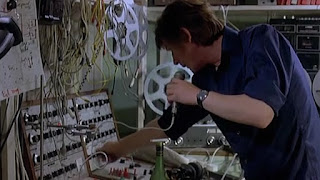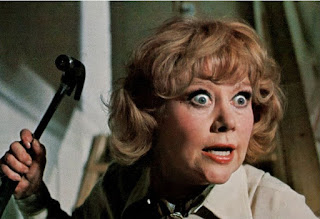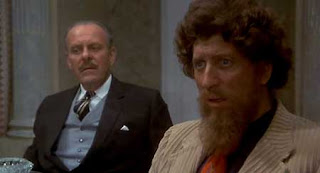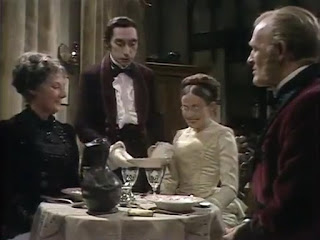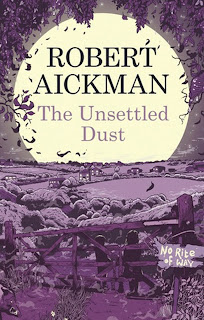For '3 Wyrd Things' I asked various creative types whose work I admire to tell us about three oddly, wonderfully, weirdly British things that have been an influence on them and their work - a book or author, a film or TV show and a song, album or musician.
This month, Grey Malkin
Musician and writer Grey Malkin was previously the guiding hand behind 'The Hare And The Moon' who released several acclaimed albums and EPs between 2009 and 2017 before going the way of all things. You can the music archived at the Bandcamp page
here.
Grey has most recently been working on new music as Embertides (with David Colohan), Widow's Weeds and in collaboration with Ashtoreth.
We are honoured that he took time out of his schedule to participate in 3 Wyrd Things.
Reading
All In The Downs, Shirley Collins
(
Buy it here)

With regards to books, I did think about focusing on some of the literature I have been reading lately; the Arthur Machen that I am revisiting such as The Great God Pan or the wyrd tales of Robert Aickman, perhaps the vintage supernatural writings of H R Wakefield. However, it is a biography that stands out in my mind as to having a substantial impact upon me, both in terms of having an emotional pull and in not being able to put the book down. Shirley Collins is without a doubt one of my favourite singers, I could listen to Love, Death and the Lady or indeed her recent Lodestar (one of her best works in my opinion) on constant repeat. Her Glasgow concert supporting Lodestar as a part of the Celtic Connections festival is one of the finest shows I have witnessed; I was therefore already greatly interested in reading about Collins as an artist. However it was the deeply human element and the joy and tragedy in her story that swept me out of my immediate surroundings onto the pages and text of the book and held me there, until I had to return reluctantly to the outside world and wait till I could pick up where I had left off. I also read All In The Downs during the summer whilst travelling around the more rural or coastal areas of Scotland and the north of England, partly in order to witness some of the seasonal folk traditions in different towns and villages. This also seemed timely and to resonate with the book itself; there is much of the experience in living alongside the natural world and of the importance of these rural and urban folkloric rituals inherent and included in Collins' writing.
Certain passages haunt and stay with me; the dysphonia that she suffered following the deep betrayal of partner Ashley Hutchings during the Lark Rise To Candleford production that essentially ended her career for nigh on thirty years, the moving and rich memories of life with her parents and sister Dolly, her dedication to folksong as a medium for the people who have sung and carried on the tradition, her journey to the States with traditional song archivist Alan Lomax and her sensitivity to the appalling racism that was present there. Collins appears to be a strikingly strong and determined character and I find her life inspiring both in artistic and human terms. She seems to bridge eras and represents the best in each. If I can be somewhat cheeky and sneak in an extra ‘watching’ element to this piece I would highly recommend The Ballad of Shirley Collins documentary for its equally honest and quietly passionate portrayal of its subject; it is very much a suitable companion piece to this biography.

Watching
The Mad Death
(Buy it here)
Ostensibly a
dystopian production about an influx of rabies into the British Isles
(primarily Scotland), The Mad Death is a curious mix of late 70’s and
early 80’s apocalyptic drama with elements of such shows as Survivors
and The Day Of The Triffids, as well as appearing like one elongated
public information film. In other words it is bleak, the countryside
foreboding and the cityscapes grim; moreover all the male leads
constantly shout and bellow all of their lines (what was with all the
shouting men in British television drama in those eras? ‘Greg’ in
Survivors and ‘Peter Brock’ in The Stone Tape are two such examples).
And
The Mad Death is relentlessly unforgiving and, at times, genuinely
frightening. With little space given to any character’s back story or
much focus on interpersonal relationships, the drama plays out like an
emergency planning exercise as to just how the country would react to
such a terrifying outbreak. For those of a certain vintage, there will
be vivid memories of the rabid fox in the wood, its mouth a mass of
yellow foam and speckled blood. That it now looks like a demented glove
puppet doesn’t entirely take away its impact; this is essentially about
man’s struggle to control nature and nature’s impassive reluctance to
submit. The rabid dog in the urban multi-story car park or loose in the
shopping centre, the rabies victims’ hydrophobia and visibly unpleasant
demise; all are etched forever on the minds of those who tuned in and
watched in horror all that time ago, emphasising to those young viewers
that the world was a deeply unsafe, unpredictable and unforgiving place.
Indeed, I recall a period at school after some
friends had managed to view The Mad Death (despite being very young and
clearly far too impressionable) which then generated an urban myth about
a three legged rabid fox that patrolled our back gardens at night. One
boy even claimed it leapt up at his sitting room window, trying to bite
and infect him through the glass and leaving saliva, foam and blood
smeared across the glass. That a three legged fox would have to be some
kind of acrobat to achieve this did not occur to us; it was the mad
death that we feared.
Recently released on DVD, it is
possible now to see the programme’s faults and lack of effects budget in
the cold light of day. Yet, it is also clear what The Mad Death’s
achievements are. There is little compromise, there are some truly
disturbing moments and it follows its premise grimly to its conclusion
in a way that would surely be softened now by character arcs or viewer
sensitivities. Plus, that foaming fox is still just a little bit
frightening.
Listening
Coil - The Ape Of Naples
(
Buy it here
)
A posthumous album in that Jhonn Balance passed a year before its release but also one in which certain songs had been frequently reworked and revisited from as far back as Coil's abandoned venture to the States to record for Trent Reznor's Nothing label, this release correspondingly sits somewhere in the liminal space between existence and another plain entirely. It is a most apt place to find Coil and there are clues, if you want to look for them, throughout the album from the opening lines of 'Does death come alone, or with eager reinforcements?' to the closing 'It just is…', the latter a sage comment from Balance that follows Going Up, a hymnal lament to the lost singer that merges the theme tune from Are You Being Served to a truly melancholy castrato and organ funeral mass. Past hauntings are subtly visible again in A Cold Cell, The Last Amethyst Deceiver and Teenage Lightning whilst It's In My Blood takes the previous A.Y.O.R. and turns it into an industrial tsunami, replete with screams and Thighpaulsandra's terrifying orchestral keyboard sweeps. All of Coil is here; from the early aural assault of Scatology, to the death psalms of Horse Rotorvator right up to the liquid moon musick of later years. And this may be why The Ape Of Naples holds such an appeal for me; it feels like the black, beating heart of Coil exists here in these songs, their manifesto and final testament combined. The last year or so has felt particularly funereal and final for me in parts and this has been a fitting soundtrack, one which I have returned to again and again for solace, humour and escape. We shall never see their like again, both Balance and Christopherson now being gone but The Ape Of Naples sits out of time and place and is possibly endless. A good thing too.
..........................................................................................
If you enjoy what we do here on Wyrd Britain and would like to help us continue then we would very much appreciate a donation towards keeping the blog going -
paypal.me/wyrdbritain















